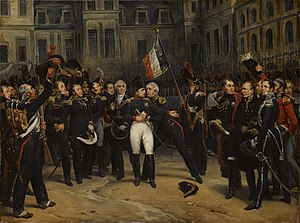Farewell speech

A farewell speech or farewell address is a speech given by an individual leaving a position or place. They are often used by public figures such as politicians as a capstone to the preceding career, or as statements delivered by persons relating to reasons for their leaving. The term is often used as a euphemism for "retirement speech," though it is broader in that it may include geographical or even biological conclusion.
In the Classics, a term for a dignified and poetic farewell speech is apobaterion (ἀποβατήριον), standing opposed to the epibaterion, the corresponding speech made upon arrival.[1]
U.S. presidential farewell addresses
[edit]Many U.S. presidential speeches have been given the moniker "farewell address" since George Washington's address in 1796.[2] Some notable examples:
- George Washington – Washington's Farewell Address in which he warned of the dangers of political parties and foreign alliances.
- Dwight D. Eisenhower – Eisenhower's farewell address in which he warned of the military–industrial complex.
- Barack Obama – Obama's farewell address made from Chicago, breaking tradition of holding one in the White House.
- Donald Trump – Trump's farewell address, delivered as a recorded, online video message from the White House.[3]
Other notable farewell speeches
[edit]| Part of a series on |
| Rhetoric |
|---|
 |
- Muhammad – Farewell Sermon, 6 March 632.
- The speech of Aeneas to Helenus and Andromache, Aeneid, Book III.[1]
- Napoleon Bonaparte – First abdication, April 6, 1814 (see Treaty of Fontainebleau (1814)).
- Napoleon Bonaparte – Farewell to the Old Guard, April 20, 1814.
- Napoleon Bonaparte – Second abdication, June 22, 1815 (see Abdication of Napoleon, 1815).
- Abraham Lincoln – Farewell address to the people of Springfield, Illinois before departing to be inaugurated as President of the United States.
- Robert E. Lee – Farewell address to the Army of Northern Virginia, the day after the end of the American Civil War.
- Douglas MacArthur – farewell speeches before Congress and U.S. Military Academy; "old soldiers never die, they only fade away" and "duty, honor, country".
- Salvador Allende - Issued a farewell speech during the 1973 Chilean coup.[4]
References
[edit]- ^ a b
 One or more of the preceding sentences incorporates text from a publication now in the public domain: Chambers, Ephraim, ed. (1728). "Apobatedion". Cyclopædia, or an Universal Dictionary of Arts and Sciences (1st ed.). James and John Knapton, et al. p. 115.
One or more of the preceding sentences incorporates text from a publication now in the public domain: Chambers, Ephraim, ed. (1728). "Apobatedion". Cyclopædia, or an Universal Dictionary of Arts and Sciences (1st ed.). James and John Knapton, et al. p. 115.
- ^ "Barack Obama's Farewell Address and 6 Other Memorable Presidential Goodbyes". Time. 9 January 2017. Archived from the original on 2018-05-01. Retrieved 2018-06-19.
- ^ "Remarks by President Trump In Farewell Address to the Nation". The White House. Archived from the original on January 28, 2021. Retrieved January 20, 2021.
- ^ Chandra, G. (2008). Narrating Violence, Constructing Collective Identities. Palgrave MacMillan UK. p. 134.
